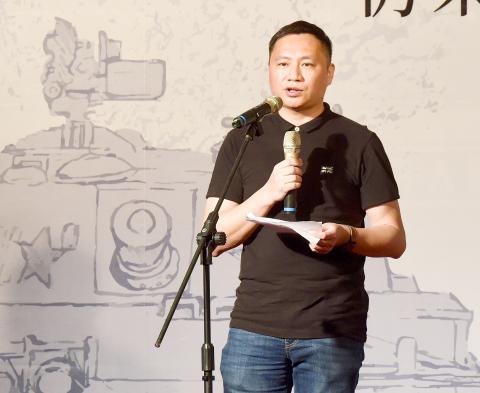Exiled Chinese democracy activist Wang Dan (王丹) and Chinese Nationalist Party (KMT) Culture and Communication Committee deputy director Hu Wen-chi (胡文琦) yesterday engaged in a war of words after Hu chided Wang for saying “there will not be Taiwanese independence without bloodshed.”
Wang, a student leader in the pro-democracy protests in Beijing in the spring of 1989, in a Facebook post marking the 28th anniversary of the Tiananmen Square Massacre on Saturday called on Taiwanese independence advocates to stop advocating independence if they are not prepared to shed blood, otherwise their words would only amount to “verbal masturbation.”
Hu yesterday commended Wang for “speaking the truth,” but criticized him for the timing of the remark, as Wang, who has spent eight years in Taiwan, is scheduled to leave for the US next month.

Photo: Huang Yao-cheng, Taipei Times
Wang has “milked” his “charmed life” in Taiwan “for all it was worth” and only spoke the truth before “abandoning” Taiwan, Hu said.
Wang said on Facebook that the KMT had deliberately misinterpreted his words.
The “bloodshed” remark was meant to encourage younger generations to fight for independence, but also act as a reminder that they should be prepared to pay a price, Wang said.
He dismissed Hu’s remarks about him living a high life in Taiwan only to abandon it.
Wang compared Hu’s words to propaganda by China’s Internet trolls, calling them “vulgar.”
He urged the KMT to “mind its own business,” saying that countless Republic of China soldiers were killed by the Chinese Communist Party during the Chinese Civil War, but instead of avenging them, the KMT has played second fiddle to Beijing.
The KMT lost its reign over China and repeated its mistake after it retreated to Taiwan, he said.
“If I were the KMT, I would have dug a hole in the ground and jumped in. How come you still have the audacity to accuse others?” Wang said. “Spokesman Hu, how shameless you are.”
Hu yesterday said he is not ashamed of “stating the facts.”
Citing a list pan-green camp politicians that have also criticized Wang’s “bloodshed” remark, he said the antipathy toward the remark had crossed party lines.
The best “revenge” the KMT can have is to promote the teachings of the democracy pioneers who died during the war and pass on Taiwan’s democratic values to all Chinese, Hu said.
Wang’s remark that the KMT should take revenge on China shows that he is not well-versed in democracy and that his thoughts have progressed little since 1989, Hu said.

The Ministry of Economic Affairs has fined Taobao NT$1.2 million (US$36,900) for advertisements that exceeded its approved business scope and ordered the Chinese e-commerce platform to make corrections in the first half of this year or its license would be revoked. Lawmakers have called for stricter supervision of Chinese e-commerce platforms and more stringent measures to prevent China from laundering its goods through Taiwan as US President Donald Trump’s administration cracks down on origin laundering. The legislature’s Finance Committee yesterday met to discuss policies to prevent China from dumping goods in Taiwan, inviting government agencies to report on the matter. Democratic Progressive Party

Taiwan and its Pacific ally Tuvalu on Tuesday signed two accords aimed at facilitating bilateral cooperation on labor affairs, according to Taiwan’s Ministry of Foreign Affairs (MOFA). The governments inked two agreements in Taipei, witnessed by Foreign Minister Lin Chia-lung (林佳龍) and visiting Deputy Tuvaluan Prime Minister Panapasi Nelesone, MOFA said in a news release. According to MOFA, the agreements will facilitate cooperation on labor issues and allow the two sides to mutually recognize seafarers’ certificates and related training. Taiwan would also continue to collaborate with Tuvalu across various fields to promote economic prosperity as well as the well-being of their

Taiwan would welcome the return of Honduras as a diplomatic ally if its next president decides to make such a move, Minister of Foreign Affairs Lin Chia-lung (林佳龍) said yesterday. “Of course, we would welcome Honduras if they want to restore diplomatic ties with Taiwan after their elections,” Lin said at a meeting of the legislature’s Foreign Affairs and National Defense Committee, when asked to comment on statements made by two of the three Honduran presidential candidates during the presidential campaign in the Central American country. Taiwan is paying close attention to the region as a whole in the wake of a

NEW WORLD: Taiwan is pursuing innovative approaches to international relations through economics, trade and values-based diplomacy, the foreign minister said Taiwan would implement a “three-chain strategy” that promotes democratic values in response to US tariffs, Minister of Foreign Affairs Lin Chia-lung (林佳龍) said. Taiwan would aim to create a “global democratic value chain,” seek to capitalize on its position within the first island chain and promote a “non-red supply chain,” Lin was quoted as saying in the ministry’s written report to the Legislative Yuan submitted ahead of the legislature’s Foreign Affairs and National Defense Committee meeting slated for today. The Ministry would also uphold a spirit of mutual beneficial collaboration, maintaining close communication and consultations with Washington to show that Taiwan-US cooperation